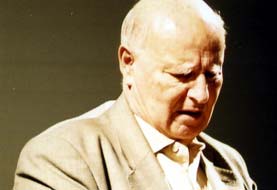
Salah Stétié
Salah Stétié was born in Beirut, Lebanon, in 1929. Already at an early age, he was led to the playful use of language by his father who himself wrote poems. The origins to his poetic creations can be found in the city of his birth, the crossroads between Arabic and European civilisation. His need for the mutual inspiration of both cultures prompted him to write in French although Arabic was his mother tongue. With this he exposed himself to the pressure of the Islamic “Integrists” who, especially from 1950 to 1960, encouraged the revival of the Arabic culture and for whom the giving up of the own language was equal to the loss of identity. Not letting this trouble him, Stétié studied Literature and Law in Beirut as well as in Paris. In the sixties he founded ‘L’Orient littéraire’, a French language cultural magazine in Beirut. This role as mediator between two cultures can be seen through his whole life. Alongside his work as diplomat in Paris, he was also ambassador in Marocco and the Netherlands and also General Secretary of the Foreign Ministry in Lebanon and lastly as delegate of UNESCO.
In his essay ‘Les porteurs de feu’ (1972), for which he was awarded the ‘Prix de l’amitié franco-arabe’, the French-Arabic friendship prize, Stétié dedicates himself to the spiritual roots of the Arabic world and questions its possible future. In 1994 he published ‘Liban plurielle’ in which he describes the specifics and yet at the same time the uncertainties due to its diversity, of the Lebanese culture. Not only in content is the Arabic culture found in Stétié’s works.
Salah Stétié was the first poet of Arabic origin who published his works in the French language. In the process of writing, a new language is created: ‘Françarabe’ where many etymological roots are taken from the Arabic but where the words are neverthe-less from the French. The musicality of his poems goes back to the tradition of Arabic poems which, with their distinct rhythm, achieve a high level of cantability.
It is therefore not surprising that the reflection on language finds significant status in his work. His text ‘Le Français, l’autre langue’ which came out in 2001, is a homage to the French language. The essay is nevertheless much more than a pure ‘Francophilie’, as Stétié doesn’t understand “a” language as a singular thing but rather more the language itself in the way the French use it.
In 1995, the poet was awarded the ‘Grand Prix de la Francophonie’ from the ‘Académie Française’ for his complete work. This includes fifty works translated into 15 languages. Today Stétié lives in France where he works as poet, essayist and art critic.
© international literature festival berlin
Les porteurs de feu
Gallimard
Paris, 1972
Fragments
Gallimard
Paris, 1978
André Pierre de Mandiargues
Seghers
Paris, 1978
Inversion de l’arbre et du silence
Gallimard
Paris, 1980
L’être poupeìe
Gallimard
Paris, 1983
Archer aveugle
Fata Morgana
St Clément, 1985
L’autre côté brûlé du très pur
Gallimard
Paris, 1992
L’interdit
José Corti
Paris, 1993
Rimbaud, le huítième dormant
Fata Morgana
Paris, 1993
L’eau froide gardée
Gallimard
Paris, 1994
L’ouvraison
José Corti
Paris, 1995
La calame
Fata Morgana
St Clément, 1996
L’enfant de cendre
Fata Morgana
Montpellier, 1996
Hermès défenestré
José Corti
Paris, 1997
Fièvre et guérison de l’Icône
Imprimerie nationale
Paris, 1998
Mallarmé sauf azur
Fata Morgana
Montpellier, 1999
Le Français, l’autre langue
Imprimerie Nationale
Paris, 2001
Pluie sur la Palestine
Al Manar
Neuilly, 2002
Le vin mystique et autres lieux spirituels de l’Islam
Albin Michel
Paris, 2002
Fiançailles de la fraîcheur
Imprimerie nationale
Paris, 2003
Carnets du méditant
Albin Michel
Paris, 2003
Brise et attestation du réel
Fata Morgana
Montpellier, 2004
Fils de la parole
Albin Michel
Paris, 2004
Kyoto
Imprimerie nationale
Paris, 2005
Liban
Imprimerie nationale
Paris, 2006
Arthur Rimbaud
Fata Morgana
Sainz-Clément-de-Rivière, 2006
Übersetzer: Curt Mayer-Clason, Stefan Weidner
